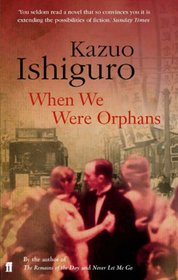Helpful Score: 3
England, 1930s. Christopher Banks has become the country's most celebrated detective, his cases the talk of London society. Yet one unsolved crime has always haunted him: the mysterious disappearance of his parents in Old Shanghai when he was a small boy. Now, as the world lurches towards total war, Banks realizes that the time has come for him to return to the city of his childhood and at last solve the mystery - that only by doing so will the world be saved from the approaching catastrophe.
Moving between London and Shanghai of the inter-war years, When We Were Orphans is a story of remembrance, deception and the longing for home; of a childhood vision of the world surviving deep into adulthood, indelibly shaping and distorting a person's life.
Helpful Score: 2
This is the most nonsensical book I've read in years. While the writing style is mature, the plot could have been laid out by a ten-year-old, or perhaps someone influenced by the opium mentioned in the book. The narration continually referred to events that were not described in the book, then things go on as though we understand what's happening. Banks is supposed to be this world-famous detective, but we never actually witness him doing anything remotely intelligent. The only detective act we see him doing involves finding a house he thinks his parents were held in 20 years ago - and he believes that both his parents are still sitting in this house, waiting to be rescued. Who kidnaps adults, puts them in a house, then feeds them for 20 years? He's ready to storm this house with only a severely wounded soldier by his side, even though the soldier can't stand up without help. Finally someone says, "Well, you've been working on this case long enough, I'll just tell you what happened. You don't have to find it out for yourself after all." We're led to believe that his parents are so important that everyone - ambassadors, Chinese police, polititians - will drop everything to help him solve the case, and once the parents are found, it will help end the war. Why? His dad was a businessman, not a diplomat. I kept waiting for everything to tie together at the end, and it doesn't. No explanation why a guy he hardly knows from school brought him to his old house, why the guys who own the house will simply hand it over to him, or what happens to the house after all. No explanation why his mother didn't simply go to the British consolate and ask for safe passage home. (That would have solved the entire book.) No sequence of events between finding the truth (if it was the truth) and finding his mother. Just isolated events happening for no reason and with no logic, until things simply end.
Helpful Score: 2
I found this book very odd, not bad odd, but odd. I could never decide if I liked the main character or not. At times he seems sympathetic and at times not at all.
Helpful Score: 2
Intriguing story, interesting details of old Shanghai. Very odd ending,not sure what to think.
Helpful Score: 2
This is the most nonsensical book I've read in years. While the writing style is mature, the plot could have been laid out by a ten-year-old, or perhaps someone influenced by the opium mentioned in the book. The narration continually referred to events that were not described in the book, then things go on as though we understand what's happening. Banks is supposed to be this world-famous detective, but we never actually witness him doing anything remotely intelligent. The only detective act we see him doing involves finding a house he thinks his parents were held in 20 years ago - and he believes that both his parents are still sitting in this house, waiting to be rescued. Who kidnaps adults, puts them in a house, then feeds them for 20 years? He's ready to storm this house with only a severely wounded soldier by his side, even though the soldier can't stand up without help. Finally someone says, "Well, you've been working on this case long enough, I'll just tell you what happened. You don't have to find it out for yourself after all." We're led to believe that his parents are so important that everyone - ambassadors, Chinese police, polititians - will drop everything to help him solve the case, and once the parents are found, it will help end the war. Why? His dad was a businessman, not a diplomat. I kept waiting for everything to tie together at the end, and it doesn't. No explanation why a guy he hardly knows from school brought him to his old house, why the guys who own the house will simply hand it over to him, or what happens to the house after all. No explanation why his mother didn't simply go to the British consolate and ask for safe passage home. (That would have solved the entire book.) No sequence of events between finding the truth (if it was the truth) and finding his mother. Just isolated events happening for no reason and with no logic, until things simply end.




